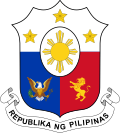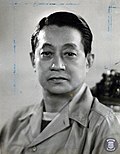1957 Philippine Senate election Last updated June 10, 2025 Electoral system Philippine Senate elections are held via plurality block voting with staggered elections , with the country as an at-large district. The Senate has 24 seats, of which 8 seats are up every 2 years. The eight seats up were last contested in 1951; each voter has eight votes and can vote up to eight names, of which the eight candidates with the most votes winning the election.
Results The Nacionalista Party won six seats contested in the election, while the Liberal Party won two.
Nacionalistas Roseller T. Lim , Cipriano Primcias Sr. , and Gil Puyat defended their Senate seats
The two winning Liberals are neophyte senators: Ambrosio Padilla and Rogelio de la Rosa . Also entering the Senate for the first time are Nacionalistas Eulogio Balao , Oscar Ledesma , and Arturo Tolentino .
Incumbent Jose Zulueta left the Nacionalista Party for the People's (Veterans) Democratic Movement for Good Government; he lost the election. Two Nacionalistas also lost: Francisco Afan Delgado and Jose Locsin .
1 2 3 4 5 6 7 8 9 10 11 12 13 14 15 16 17 18 19 20 21 22 23 24 Before election ‡ ‡^ ‡ ‡ ‡ ‡ ‡ ‡ Election result Not up LP NP Not up After election + + * * * √ √ √
Key:
‡ Seats up + Gained by a party from another party √ Held by the incumbent * Held by the same party with a new senator ^ Vacant Per candidate Candidate Party Votes % Gil Puyat Nacionalista Party 2,189,909 42.87 Arturo Tolentino Nacionalista Party 1,982,708 38.81 Eulogio Balao Nacionalista Party 1,851,157 36.24 Rogelio de la Rosa Liberal Party 1,715,123 33.58 Oscar Ledesma Nacionalista Party 1,670,774 32.71 Ambrosio Padilla Liberal Party 1,636,202 32.03 Roseller T. Lim Nacionalista Party 1,558,322 30.51 Cipriano Primicias Sr. Nacionalista Party 1,350,868 26.45 Jose Locsin Nacionalista Party 1,347,797 26.39 Francisco Afan Delgado Nacionalista Party 1,320,296 25.85 Osmundo Mondoñedo Liberal Party 1,011,053 19.79 Raul Manglapus Progressive Party 1,005,595 19.69 Narciso Pimentel Jr. Liberal Party 1,004,944 19.67 Estanislao Fernandez Liberal Party 997,562 19.53 Juan Liwag Liberal Party 918,785 17.99 Consuelo Salazar-Perez Liberal Party 844,950 16.54 Marcos Calo Liberal Party 769,599 15.07 Pacita de los Reyes-Phillips Nationalist Citizens' Party 641,716 12.56 Terry Adevoso Progressive Party 562,491 11.01 Josefa Gonzales-Estrada Progressive Party 423,319 8.29 Antonio Maceda Nationalist Citizens' Party 383,531 7.51 Jaime Ferrer Progressive Party 345,881 6.77 Jose M. Hernandez Progressive Party 339,909 6.65 Fulvio Pelaez Progressive Party 313,221 6.13 Mario Bengzon Nationalist Citizens' Party 265,859 5.20 Jose Zulueta People's (Veterans) Democratic Movement for Good Government 213,465 4.18 Norberto Romualdez Jr. Progressive Party 210,822 4.13 Rodrigo Perez Jr. Progressive Party 192,697 3.77 Cipriano Cid Nationalist Citizens' Party 162,493 3.18 Emilio Javier Nationalist Citizens' Party 155,867 3.05 Vicente Llanes Nationalist Citizens' Party 124,744 2.44 Manuel Abella Nationalist Citizens' Party 116,509 2.28 Gonzalo Vasquez Nationalist Citizens' Party 99,253 1.94 Severino Luna Independent 59,690 1.17 Remedios Magsaysay Independent 59,000 1.16 Atilano Cinco People's (Veterans) Democratic Movement for Good Government 48,863 0.96 Vicente Rafael People's (Veterans) Democratic Movement for Good Government 47,883 0.94 Miguel Pendon People's (Veterans) Democratic Movement for Good Government 24,458 0.48 Felicidad Villanueva Women's Party 14,725 0.29 Antonia Lumibao People's (Veterans) Democratic Movement for Good Government 11,916 0.23 Dominador Portugal Lapiang Malaya 8,915 0.17 Eulogio Duyan Lapiang Malaya 8,434 0.17 Romualdo Saclayan Lapiang Malaya 8,235 0.16 Deogracias Pedrosa Lapiang Malaya 7,919 0.16 Jose Villanueva Lapiang Malaya 7,805 0.15 Luis de Guzman Lapiang Malaya 7,781 0.15 Emmanuel Rey Lapiang Malaya 7,123 0.14 Teofilo Ramas Lapiang Malaya 6,470 0.13 Jose Canuto Independent 6,147 0.12 Arturo Samaniego Liberal Party (Quirino wing) [ a] 2,515 0.05 Ciriaco de las Liagas Independent 2,427 0.05 Patricio Ceniza Independent 2,119 0.04 Gregorio Llanza Independent 1,333 0.03 Consuelo Fa Alvear Independent 1,135 0.02 Total 28,072,314 100.00 Total votes 5,108,112 – Registered voters/turnout 6,763,897 75.52
↑ The supporters of Antonio Quirino in the Liberal Party ran candidates under the Quirino wing of that party. Per party Party Votes % +/– Seats Up Before Won After +/− Nacionalista Party 13,271,831 47.28 −19.90 6 20 6 20 +1 Liberal Party 8,898,218 31.70 −1.01 0 0 2 2 +2 Progressive Party 3,393,935 12.09 New 0 0 0 0 0 Nationalist Citizens' Party 1,949,972 6.95 New 0 2 0 2 0 People's (Veterans) Democratic Movement for Good Government 346,585 1.23 New 1 1 0 0 −1 Lapiang Malaya 62,682 0.22 New 0 0 0 0 0 Women's Party 14,725 0.05 New 0 0 0 0 0 Liberal Party (Quirino wing) 2,515 0.01 New 0 0 0 0 0 Independent 131,851 0.47 +0.45 0 0 0 0 0 Vacancy 1 1 0 0 −1 Total 28,072,314 100.00 – 8 24 8 24 0 Total votes 5,108,112 – Registered voters/turnout 6,763,897 75.52 Source: [ 1] [ 2]
Vote share NP
47.28% LP
31.70% Others
21.02%
Senate seats NP
75.00% LP
25.00% Others
0.00%
This page is based on this
Wikipedia article Text is available under the
CC BY-SA 4.0 license; additional terms may apply.
Images, videos and audio are available under their respective licenses.






